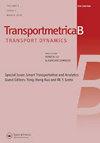城市轨道交通线路动态需求下的列车路线规划与时刻表综合优化
IF 3.4
2区 工程技术
Q2 TRANSPORTATION
引用次数: 5
摘要
本文章由计算机程序翻译,如有差异,请以英文原文为准。
Integrated optimization of train route plan and timetable with dynamic demand for the urban rail transit line
ABSTRACT In the urban rail transit system, train timetabling according to the dynamic passenger demand is important to offer high-quality service. Timetable optimization with the predetermined train route plan cannot synchronously consider the spatial and temporal characteristics of demand. Based on the Automated Fare Collection (AFC) data, this study proposes the integrated optimization (IO) to make route plan and timetable. A mixed-integer nonlinear programming (MINLP) model is formulated with the aim of reducing passenger penalty travel time and operation penalty cost. An improved non-dominated sorted genetic algorithm-II (Improved NSGA-II) is applied to deal with the bi-objective problem. A numerical experiment is used to prove the effectiveness and efficiency of the model and the algorithm. Then, the IO approach is applied in a bi-directional urban rail transit line. The results show that the IO performs the best compared with two other feasible strategies, namely the current optimization (CO) and phased optimization (PO).
求助全文
通过发布文献求助,成功后即可免费获取论文全文。
去求助
来源期刊

Transportmetrica B-Transport Dynamics
TRANSPORTATION SCIENCE & TECHNOLOGY-
CiteScore
5.00
自引率
21.40%
发文量
53
期刊介绍:
Transportmetrica B is an international journal that aims to bring together contributions of advanced research in understanding and practical experience in handling the dynamic aspects of transport systems and behavior, and hence the sub-title is set as “Transport Dynamics”.
Transport dynamics can be considered from various scales and scopes ranging from dynamics in traffic flow, travel behavior (e.g. learning process), logistics, transport policy, to traffic control. Thus, the journal welcomes research papers that address transport dynamics from a broad perspective, ranging from theoretical studies to empirical analysis of transport systems or behavior based on actual data.
The scope of Transportmetrica B includes, but is not limited to, the following: dynamic traffic assignment, dynamic transit assignment, dynamic activity-based modeling, applications of system dynamics in transport planning, logistics planning and optimization, traffic flow analysis, dynamic programming in transport modeling and optimization, traffic control, land-use and transport dynamics, day-to-day learning process (model and behavioral studies), time-series analysis of transport data and demand, traffic emission modeling, time-dependent transport policy analysis, transportation network reliability and vulnerability, simulation of traffic system and travel behavior, longitudinal analysis of traveler behavior, etc.
 求助内容:
求助内容: 应助结果提醒方式:
应助结果提醒方式:


